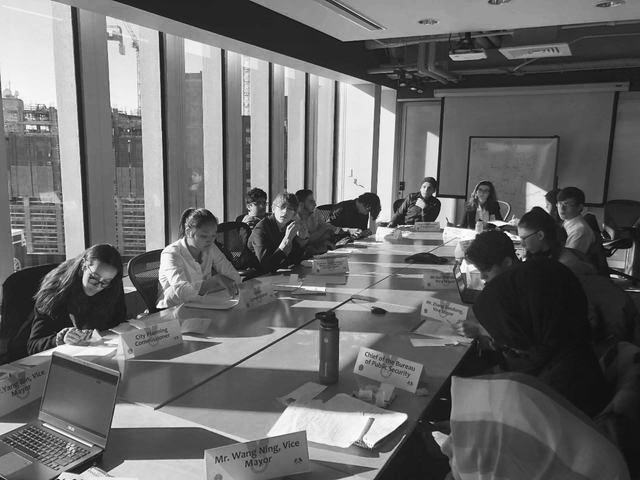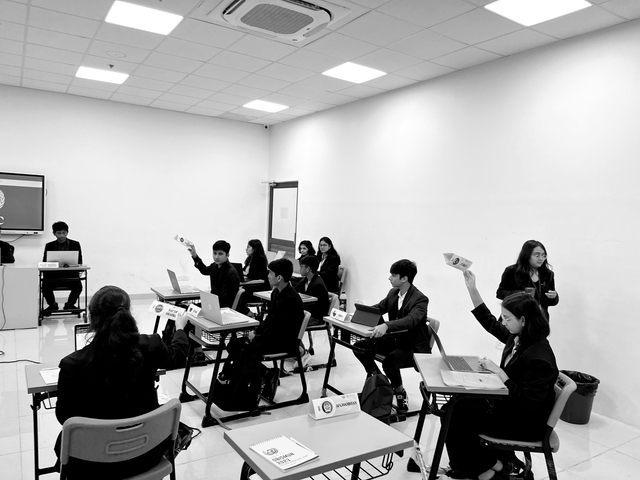Committee Courtesy: A Guide to Harmonious Collaboration
Aaleiya Rebello and Sara Desa • 2024-05-13
First-time MUNers face challenges grasping decorum. Remember formalities, respectful language, time limits, and yielding methods for effective participation.
Being a first time MUNer is an intimidating and challenging experience, especially comprehending and following decorum in committee.
Learning your speeches and doing your research is a task in itself, and following MUN decorum during a session becomes yet another source of jeopardy for most. To aid you through your first MUN experience, we have come up with a list of a few things to keep in mind to make the process easier.
It also helps to keep in mind that despite how formidable first MUN experiences are, they are experiences that allow you to learn and you can definitely grow from them as everyone starts somewhere. Each conference will help you build your confidence and hone your skills of diplomacy and propel you into directions that will help transform the world.
- Most committees start with a roll call at the beginning of each session. When the roll call is being taken at the beginning of the session, you can answer with either ‘present’ or ‘present and voting’. If you choose to say ‘present and voting’, it means that you will need to vote on all resolutions and cannot exercise the right to abstain from voting throughout the conference.
- When trying to put your point forth, make sure to hold the placard of your respective country high so that the name of your country is clearly visible to the other delegates as well as the Executive Board.
- Always try to familiarise yourself with the other delegates and form some relations before the committee commences or during breaks. This will help you later on in forming blocs as well and aid in drafting resolutions.
- When referring to yourself or to any other delegates, refrain from making use of personal pronouns. Instead, use the term ‘delegate’ to address them.
- Address each delegate with the official title of their country - for example, ‘The delegate of Germany’. If questioning a delegate on a particular statement they made, it is necessary to quote them.
- Ensure that you make use of a formal tone, as well as formal language, for example, when referring to the chair, refer to them as ‘honourable chair’, or the delegates as ‘distinguished delegates’.
- When giving a speech, always stick to the time limit. If you run out of time, request the chair to give you more time, and if they decline, respond by saying thank you and be seated, however it is preferable to remain within the time constraints.
- In the event that the leader of your respective delegation dies, ensure to turn the placard upside down to signify the death. Example: If the delegate of Narendra Modi has been killed in a crisis update, the delegate should turn their placard upside down.
- If you are left with additional time after your speech, you will need to yield this time. Time can be yielded in any of the following ways:
- Yield to the chair - If you choose to yield time to the chair, it means that they can proceed to the next person on the list or ask you a question in reference to your speech.
- Yield to another delegate - The time remaining can be added to another delegate’s speech as well, if you choose to yield the time to them. The consent of the delegate who will receive your time is also necessary, and ideally, should be conveyed to the chair prior to the speech itself.
- Yield to the floor - If you choose to yield your time to the floor, the chair can choose to recognise the delegates who wish to speak.
- Yield to questions - The delegate has the option of yielding the time to questions, during which any delegate can raise questions pertaining to the points made in the speech. Only the time taken to answer is considered. To ask a question, the delegate needs to raise their placard and be recognised by the chair and ask their question to the chair. The chair then asks the delegate if they wish to accept, reject, or like the question to be rephrased. The delegates may choose to reply via a note. The duration of the question session is up to the discretion of the chair.
- Finally, it is imperative to be respectful and civil in committee despite the differences in stance according to delegation.
Please feel free to reach out to the Executive Board or other delegates in case of any queries during unmoderated caucasus.
For the delegates doing a MUN for the first time, try to keep these points in mind for a fruitful experience. Wishing you all the very best and we look forward to seeing you at DBIS MUN 2024.
See More Posts
Don Bosco International Model United Nations 2024
Don Bosco International School, Nathalal Parekh Marg, Matunga, Mumbai - 400019
Copyright © 2024 DBIS, Inc. All rights reserved.



